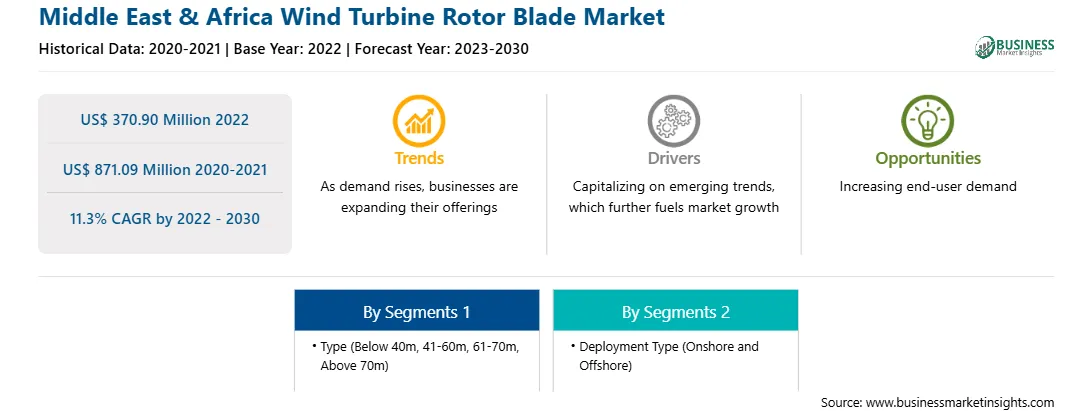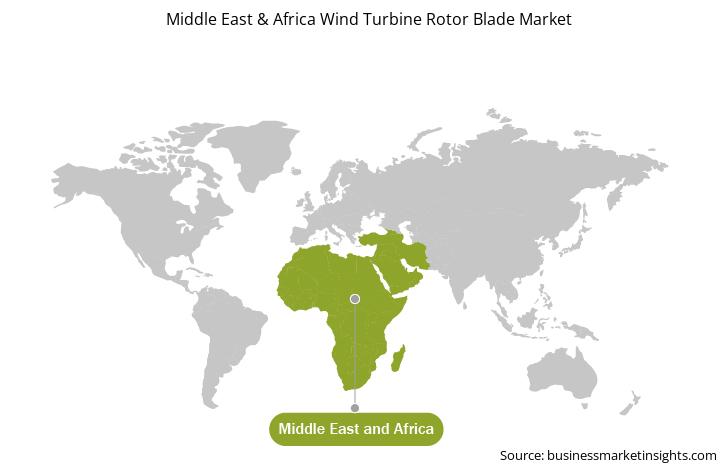The Middle East & Africa wind turbine rotor blade market was valued at US$ 370.90 million in 2022 and is expected to reach US$ 871.09 million by 2030; it is estimated to grow at a CAGR of 11.3% from 2022 to 2030.
Key players in the wind turbine blade industry continuously focus on developing innovative designs and materials for the turbine blade to increase overall efficiency. In the last two years, many public and private organizations have successfully developed recycled blade manufacturing processes. For instance, Siemens Games came up with the industry's first recycled blade for offshore and onshore wind farms. Moreover, many private organizations have developed recycling processes for decommissioned wind turbine blades. Previously, the industry was unable to recycle wind turbine blades after decommissioning, owing to which the blades would end up in the trash, further increasing the need for waste management activities and the risk of environmental pollution. With these innovative recycling methods, blade materials can be recycled and repurposed in various sectors. For instance, Carbon Rivers developed a method for recovering clean, mechanically intact glass fiber from decommissioned wind turbine blades. These methods will help the wind turbines to become truly sustainable. Such initiatives are expected to reduce the overall impact generated by wind turbine blades, allowing energy companies to deploy a high number of offshore wind turbines without any risks of environmental pollution and the government's stringent regulations or limitations.
The Middle East & Africa holds a large potential for generating wind energy owing to the abundant availability of wind resource. As per the GWEC report published in 2023, the Middle East & Africa is expected to add 17 GW of new wind power capacity by 2027. Among these, the 17 GW capacity additions from 2023 to 2027 will come from South Africa, 3.6 GW from Egypt, 2.4 GW from Saudi Arabia, and 2.2 GW from Morocco. The GWEC estimated the African continent alone has more than 59,000 GW of technical wind resource potential, which is quite enough to fulfill the continent's energy demand by 250 times. However, the current installed wind power capacity in Africa only accounts for 0.01% of this potential. Thus, such huge potential of wind resources holds a lucrative opportunity for the country, which can help drive the wind turbine rotor blade market growth over the projected period.
Strategic insights for the Middle East & Africa Wind Turbine Rotor Blade provides data-driven analysis of the industry landscape, including current trends, key players, and regional nuances. These insights offer actionable recommendations, enabling readers to differentiate themselves from competitors by identifying untapped segments or developing unique value propositions. Leveraging data analytics, these insights help industry players anticipate the market shifts, whether investors, manufacturers, or other stakeholders. A future-oriented perspective is essential, helping stakeholders anticipate market shifts and position themselves for long-term success in this dynamic region. Ultimately, effective strategic insights empower readers to make informed decisions that drive profitability and achieve their business objectives within the market. The geographic scope of the Middle East & Africa Wind Turbine Rotor Blade refers to the specific areas in which a business operates and competes. Understanding local distinctions, such as diverse consumer preferences (e.g., demand for specific plug types or battery backup durations), varying economic conditions, and regulatory environments, is crucial for tailoring strategies to specific markets. Businesses can expand their reach by identifying underserved areas or adapting their offerings to meet local demands. A clear market focus allows for more effective resource allocation, targeted marketing campaigns, and better positioning against local competitors, ultimately driving growth in those targeted areas.Middle East & Africa Wind Turbine Rotor Blade Strategic Insights

Middle East & Africa Wind Turbine Rotor Blade Report Scope
Report Attribute
Details
Market size in 2022
US$ 370.90 Million
Market Size by 2030
US$ 871.09 Million
Global CAGR (2022 - 2030)
11.3%
Historical Data
2020-2021
Forecast period
2023-2030
Segments Covered
By Type
By Deployment Type
Regions and Countries Covered
Middle East and Africa
Market leaders and key company profiles
Middle East & Africa Wind Turbine Rotor Blade Regional Insights

The Middle East & Africa wind turbine rotor blade market is segmented based on type, deployment type, and country. Based on type, the Middle East & Africa wind turbine rotor blade market is segmented into Below 40m, 41-60m, 61-70m, and Above 70m. The Above 70m segment held the largest market share in 2022.
Based on deployment type, the Middle East & Africa wind turbine rotor blade market is bifurcated into onshore and offshore. The onshore held a larger market share in 2022.
Based on country, the Middle East & Africa wind turbine rotor blade market is segmented into Saudi Arabia, Egypt, South Africa and the Rest of Middle East & Africa. South Africa dominated the Middle East & Africa wind turbine rotor blade market share in 2022.
TPI Composites Inc, Vestas Wind Systems AS, ENERCON GmbH, LM Wind Power AS, Siemens Gamesa Renewable Energy SA, Acciona SA, Suzlon Energy Ltd, Nordex SE, and Envision Energy USA Ltd are some of the leading companies operating in the Middle East & Africa wind turbine rotor blade market.
1. TPI Composites Inc
2. Vestas Wind Systems AS
3. ENERCON GmbH
4. LM Wind Power AS
5. Siemens Gamesa Renewable Energy SA
6. Acciona SA
7. Suzlon Energy Ltd
8. Nordex SE
9. Envision Energy USA Ltd
The Middle East & Africa Wind Turbine Rotor Blade Market is valued at US$ 370.90 Million in 2022, it is projected to reach US$ 871.09 Million by 2030.
As per our report Middle East & Africa Wind Turbine Rotor Blade Market, the market size is valued at US$ 370.90 Million in 2022, projecting it to reach US$ 871.09 Million by 2030. This translates to a CAGR of approximately 11.3% during the forecast period.
The Middle East & Africa Wind Turbine Rotor Blade Market report typically cover these key segments-
The historic period, base year, and forecast period can vary slightly depending on the specific market research report. However, for the Middle East & Africa Wind Turbine Rotor Blade Market report:
The Middle East & Africa Wind Turbine Rotor Blade Market is populated by several key players, each contributing to its growth and innovation. Some of the major players include:
The Middle East & Africa Wind Turbine Rotor Blade Market report is valuable for diverse stakeholders, including:
Essentially, anyone involved in or considering involvement in the Middle East & Africa Wind Turbine Rotor Blade Market value chain can benefit from the information contained in a comprehensive market report.